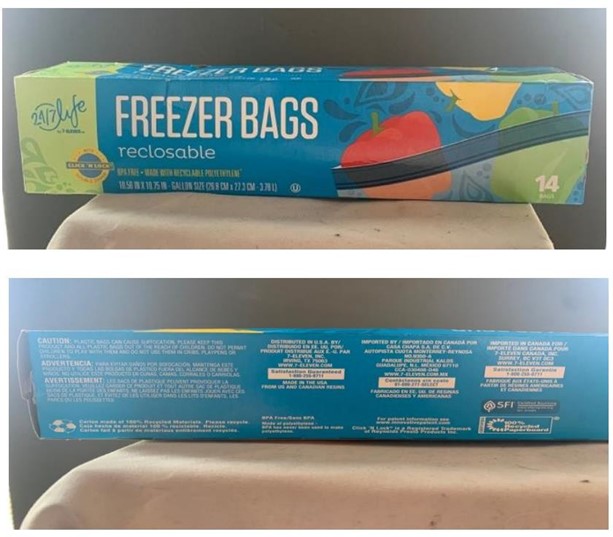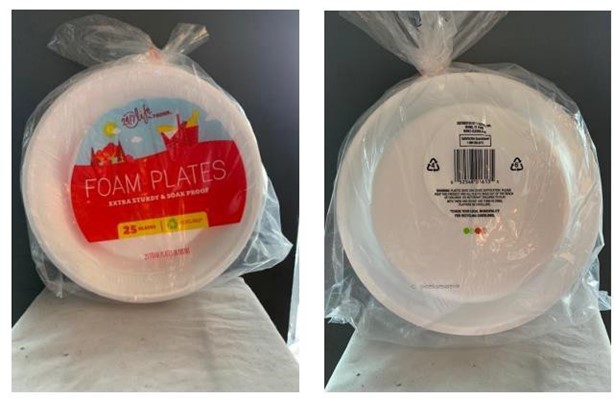Curtis v. 7-Eleven, Inc., No. 1:21-cv-06079 (N.D. Ill. Sept. 13, 2022)
Curtis sued over
“recyclable” claims on 7-Eleven products; the court rejects theories based on
the fact that most “recyclable” plastic isn’t recycled, but accepts
theories based on claims that it wasn’t even recyclable for lack of appropriate
marking of what kind of plastic it was (designations known as RIC labels that “give
recycling facilities the necessary information to sort the products”).
 |
| "recyclable" bags |
 |
| recyclable cups |
 |
| "recyclable" foam plates |
 |
| "recyclable" red cups |
The court was
broadly skeptical of the claims—though the “recyclable” label wasn’t “hard to
spot,” the court wondered if 7-Eleven consumers “bothered to look at the
packaging at all” when buying red party cups. But Curtis alleged that she read
it and cared, which sufficed “for now.”
She allegedly
“reasonably understood that the products would actually be recycled if she
placed them for recycling with her municipal recycling service.” But they
weren’t.
The court thought
that the lack of actual recycling was “extrinsic” to the product—not the
product’s fault (despite false advertising’s strict liability)—while the lack
of RIC designations was “intrinsic.”
There’s also a
label on the back of the package: “CHECK YOUR LOCAL MUNICIPALITY FOR RECYCLING
GUIDELINES.” Curtis argued that this made things worse, by suggesting that this
would work.
The court adopted the majority approach to class standing: “a plaintiff may have standing to assert claims on behalf of class members based on products he or she did not purchase as long as the products and alleged misrepresentations about a purchased product are substantially similar.” 1 McLaughlin on Class Actions § 4:28 (18th ed. 2021) (citations omitted). That factual, contextual inquiry could be carried out later.
She lacked standing
to seek injunctive relief, though.
Since “recyclable”
was literally true, the claims based on the absence of actual
recycling/practical unrecyclability weren’t plausible. What about deceptiveness
even absent literal falsity? “Recyclable” “is not a promise about the state of
the recycling industry. It is not a prediction of what is likely to happen
after a product hits the recycling bin.” “Recyclable” does not mean “destined
for inevitable recycling.” And it does not mean “likely to be recycled.” How
does the court know what consumers think? It doesn’t; the court just thinks
it’s not reasonable for consumers to construe “recyclable” to mean “will be
recycled if you put it in a recycling receptacle.” The court reasoned that, if
you buy a bottle of water marked “recyclable” in Chicago, where there is
recycling, and take it hundreds of miles away where there is not, nothing about
the bottle changed, so it would be wrong to say that “recyclable” became
untrue. “True, maybe consumers have unreasonable expectations about how often
products are recycled. But that’s not on 7-Eleven.” Um. If these beliefs are
widely held, why are they unreasonable? What is reasonable or ordinary about
the hypothetical in which Chicago consumers travel hundreds of miles into
recycling deserts?
The court was
concerned that a different holding would have “sweeping” implications because
so little plastic recycling is being done. But isn’t that kind of important for
consumers who want to participate in recycling to know? The court: “[I]t is hard
to see why a manufacturer should be on the hook for deception when the consumer
brings misinformation or unrealistic expectations into the picture.” What is
unrealistic about believing that a package that says “recyclable” means
something meaningful by it?
The court’s other
“-able” analogies include things like “drinkable” and “drivable”—terms used in
fairly different contexts than advertising. If a package said its contents were
“drinkable” I definitely wouldn’t think “well, it’s drinkable, but I’m unlikely
to be able to drink it.” Other common “able” advertising words have no obvious
gap between “it’s possible to do X” and “you will be able to do X”:
returnable, refundable, redeemable, transferable. Where the consumer might not be
able to return, get a refund, redeem, or transfer, we expect those limits to be
disclosed in the ad!
In a footnote, the
court asks: “If a consumer has an inaccurate understanding or an unrealistic
expectation about the likelihood of recycling, is that person still a
reasonable consumer?” This question should not be left to a footnote or left
answered only implicitly; it is the central question. And neither the history
of consumer protection law nor the meaning of “misleading” suggest that the
answer is “if you don’t understand exactly how the world works in every detail,
too bad for you.”
Ultimately, “[m]aybe
the average consumer expects that ‘recyclable’ products will be recycled. But
that’s not what that word means. Expectations are one thing; representations
are another.” Note the absence of any discussion of misleadingness: only
explicit falsity apparently counts as long as “7-Eleven did not create the
unreasonable expectations through misrepresentations.”
After all this, the
court insists that it’s applying the reasonable consumer standard, and says
that consumers aren’t expected “to parse packaging like lawyers.” Even though “consumer-protection
laws must meet consumers where they are,” “there are limits on the pliability
of words.” But what are those limits? Apparently, they are not created by
reasonable consumers’ beliefs. At some point, words can’t be stretched “so
far.” [Puffery/falsifiability should do that work, though: does the claim
communicate a specific message to reasonable consumers? Adding some extra
element beyond that just makes the law unpredictable and leaves consumers
exposed to deception.]
The complaint also
relied on the FTC’s Green Guides, which do tell sellers to take into account
whether recycling facilities are actually available, though they don’t
purport to bar the sale of recyclable-labeled products in areas where they
aren’t as long as facilities are available in most areas. They also suggest
additional labeling where availability is patchy. But the court didn’t find the
Green Guides very “useful” “when evaluating the views of a reasonable consumer
at a convenience store. Your average consumer at 7-Eleven probably doesn’t have
the FTC’s policy statements at his or her fingertips when picking up a bag of
foam plates for the backyard BBQ.”
[But the FTC’s
approach, unlike the court’s, is based on empirical research about what
consumers actually think when they see “recyclable.”]
Claims based on the
lack of RIC designations survived, though, because they were consistent with
lack of recyclability: without the markings, the products can’t be
recycled. Thus, Illinois Consumer Fraud Act, warranty, and unjust enrichment
claims survived only as to the RIC-based allegations.






No comments:
Post a Comment